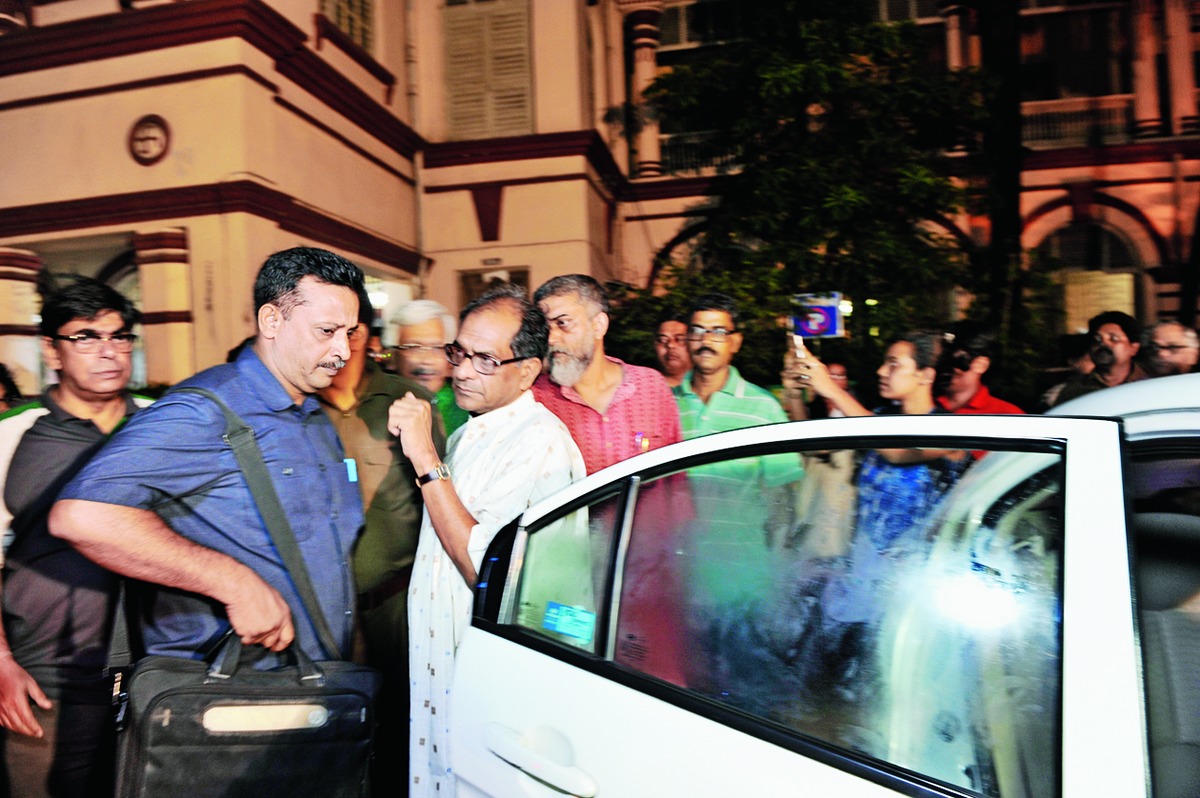
Jadavpur: Jadavpur University vice-chancellor Suranjan Das was allowed to go home at 11.20pm on Thursday after being held hostage for 31 hours by students.
A delegation of students visited Das around 11pm at his chamber on the first floor of Aurobindo Bhavan, the administrative headquarters of the varsity, and told him that he may go home but, if he did so, he would be "trampling on the demands of hundreds of students".
Das walked to his car a few minutes later. The other executive council members who were with the VC followed.
A student leader said there was no question of blockading Das as theirs was "a sit-in, not a gherao".
Avik Das, general secretary of the engineering and technology faculty students' union (Fetsu), who was part of the student delegation that told VC Das he could go home, told Metro close to midnight: "Our protest will continue. We will not allow an only marks-based admission in humanities."
Another student leader, Debraj Koley from the arts stream, said they would formulate "new methods of protest".
"We have given the authorities time till 3pm on Friday. Go back to the EC decision of June 27 - admission based on equal weightage to tests and marks. If they don't, we will resort to new methods of protest," Koley said.
Earlier in the day, JU announced the schedule of a marks-based admission.
A notice posted on the university's website says: "The written admission test as notified earlier for admission to BA (Hons) courses stands cancelled. The online submission of application to BA (Hons) courses will reopen on and from 06/07/2018 to 12/07/2018. The last date for submission of application fees through SBI Collect system is 15/7/2018."
The provisional merit list will be published on July 19. The deadline to fill up the form has been extended for the third time.
"The students would have to come to the departments to complete the counselling procedure on four days - July 27, 28, 30 and 31. The classes would commence from August 1," dean of arts Subhasis Biswas said after the meeting of the admissions committee.
He said the detailed counselling schedule, entailing the department-wise counselling break-up, would be posted on the university website.
The counselling procedure includes verifying the mark sheets and other documents and finding out from the prospective student why he opted to study the programme.
When Metro asked how the admission procedure would be continued within the English department, given that the majority of the teachers have decided to abstain from the counselling process, Biswas said: "I have received submission from these teachers. We have to think of an alternative system... That would be worked out in consultation with the university administration".
At a news conference, vice-chancellor Das said: “I will once again appeal to them (the teachers who have said they would not be part of the admission process). Executive council is the highest body. Then does it mean a decision taken by the executive council can be ignored by teachers? I will make an appeal. They have a right to protest. Of course they have a right to protest. I will make an appal. I hope good senses will prevail. I hope my appeals will be taken care of. In the admissions committee meeting today I am very happy that the English department proposed the model in which the marks will be assessed so far as the entrance on the basis of board exam.”
He added in response to another question: “I'm grateful to those honourable members who finally came to the conclusion that they had written on a piece of paper, it is on record: although they still believe that the admission test is the best possible way to admit students, for this year, to resolve the impasse they would prefer to have admission on the basis of marks.”
Das iterated several times that students could not protest an admission process. Told that teachers too were protesting, he said: “Do they repose no faith in the teacher representatives who were present at the meeting of the admissions committee and the executive council? These are simple questions.”










